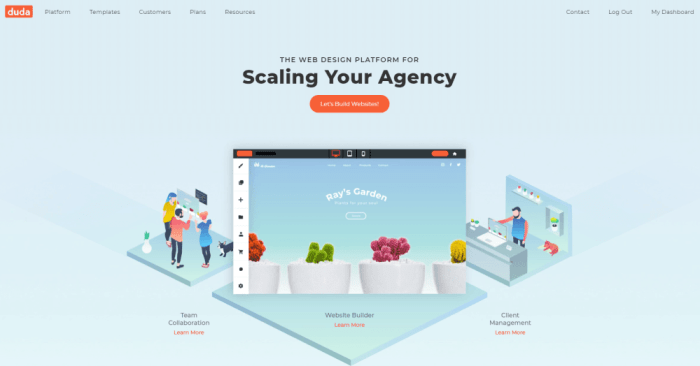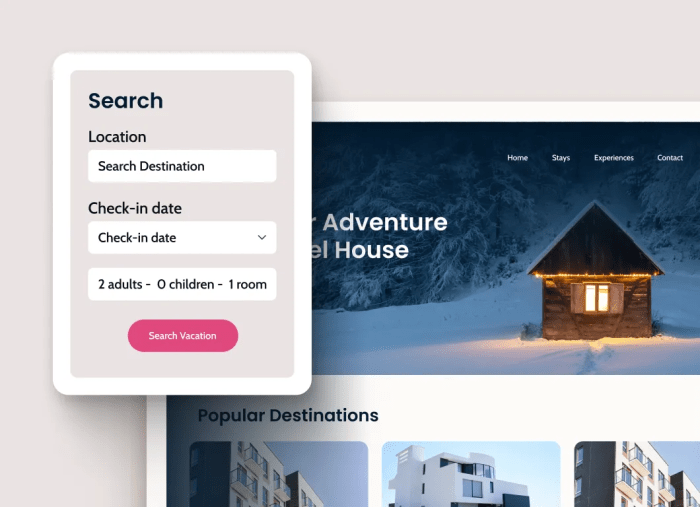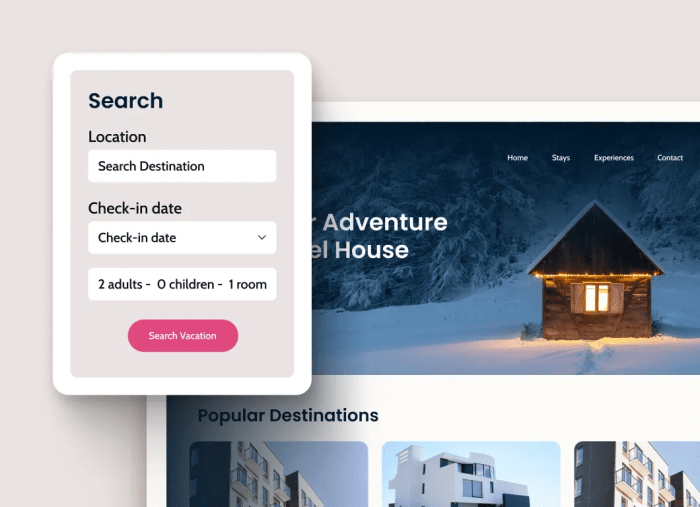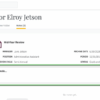What is Duda website platform and is it a good fit for agencies? This deep dive explores Duda’s capabilities, examining its strengths and weaknesses from an agency perspective. We’ll cover its features, pricing, support, and how it compares to competitor platforms. This comprehensive look will help you determine if Duda aligns with your agency’s needs and goals.
Duda offers a drag-and-drop interface and a robust feature set, making website creation relatively straightforward. However, it’s important to understand if Duda’s limitations might hinder your agency’s workflow. We’ll analyze the platform’s pros and cons, helping you make an informed decision.
Introduction to Duda Website Platform

Duda is a website building platform that simplifies the process of creating professional-looking websites, particularly for agencies and businesses that need a flexible and user-friendly solution. It offers a range of features, from drag-and-drop page editors to advanced customization options, allowing users to build websites without extensive coding knowledge. This platform caters to a diverse audience, from small businesses to large corporations, who value speed and ease of use.Duda’s platform is designed to empower users with the tools to create visually appealing and functional websites.
Its core functionality centers around intuitive design tools and robust backend management capabilities, allowing users to customize and maintain their sites with minimal technical expertise. This ease of use, coupled with a variety of pre-built templates and customizability, makes Duda a popular choice for agencies and businesses seeking a rapid website development solution.
Key Features and Functionalities
Duda’s platform boasts a comprehensive set of features designed to streamline the website creation process. These include drag-and-drop page editors, customizable templates, e-commerce capabilities, and mobile responsiveness. The platform also allows users to integrate various marketing tools and manage content effectively. These features enable businesses to build and maintain professional websites without extensive technical knowledge.
Target Audience
Duda’s platform targets a broad spectrum of users. From small businesses looking for an easy way to establish an online presence to large corporations needing a scalable solution, Duda provides the tools to create visually appealing and functional websites. Agencies that want a user-friendly platform for their clients will also find Duda valuable. The ease of use and customization options make it a versatile choice for various business needs.
Examples of Websites Built Using Duda
Numerous websites of diverse industries have been built using Duda. For instance, retail stores have leveraged Duda’s e-commerce capabilities to create online storefronts, allowing them to expand their reach and manage their inventory efficiently. Additionally, many agencies have successfully used Duda to create websites for their clients, showcasing its adaptability for various design aesthetics and functionalities. This wide range of applications demonstrates Duda’s versatility in the digital landscape.
Pricing Tiers and Features
| Pricing Tier | Features Included | Target Customer Profile |
|---|---|---|
| Starter | Basic website creation tools, limited storage, basic e-commerce, limited customization | Small businesses with basic website needs, freelancers starting their online presence. |
| Pro | Enhanced customization options, increased storage, advanced e-commerce features, tools, marketing integrations | Growing businesses, agencies requiring more robust features for their clients. |
| Enterprise | Unlimited storage, dedicated support, custom integrations, advanced analytics, enterprise-level e-commerce solutions | Large corporations, large agencies with high-volume client needs. |
Duda’s Strengths for Agencies
Duda’s website platform offers a compelling suite of tools for agencies, streamlining the design and development process while delivering robust website solutions for clients. Its user-friendly interface and intuitive features empower agencies to quickly create visually appealing and functional websites, ultimately boosting their efficiency and client satisfaction.Agencies find significant value in Duda’s platform due to its comprehensive functionality and focus on ease of use.
Duda is a website platform that’s gaining traction, but is it the right choice for agencies? It offers a lot of flexibility and customization, but whether it’s a good fit depends on the specific needs of your clients. Ultimately, optimizing your campaigns for maximum ROI is key, and learning how to bid smarter using Google’s smart bidding strategies can significantly improve results.
Bid smarter using Google smart bidding will help you understand the mechanics of better campaign performance, which will ultimately help you decide if Duda is the right platform for your agency’s clients.
This translates to faster project turnaround times and reduced development costs, which are key factors for attracting and retaining clients in a competitive market.
Simplified Website Development for Agencies
Duda’s drag-and-drop interface makes website creation remarkably straightforward. This empowers agency designers and developers to focus on creative design and functionality, rather than getting bogged down in complex coding. This translates to more time for client communication and project management, a key advantage for agencies. The platform’s pre-built templates provide a strong foundation for a wide range of website types, from simple landing pages to complex e-commerce stores.
Duda website platform is a powerful tool, but is it the right choice for agencies? It depends, really. Thinking about how agencies can use Duda to boost their clients’ online presence, and unlock business success with digital transformation, is key. Unlocking business success with digital transformation often hinges on the right website platform, and Duda could be a solid option for some agencies, depending on their specific needs and client projects.
Ultimately, evaluating Duda’s features and flexibility for your agency’s work is essential.
This significantly reduces the time required to build a website from scratch, leading to faster project completion.
Key Features Beneficial for Agencies
Duda offers several features specifically designed to enhance the agency workflow. These include:
- Pre-built templates: These provide a solid foundation, allowing agencies to quickly get started on a project without extensive customization. This saves valuable time and resources, ultimately lowering development costs and speeding up turnaround times for clients.
- Customizable templates: Agencies can modify pre-built templates to match specific client needs and brand identities. This allows for a balance between efficiency and personalization, creating tailored website experiences for each client.
- Mobile responsiveness: Duda’s websites automatically adapt to different screen sizes, ensuring a seamless user experience across all devices. This is crucial for agencies operating in a mobile-first world and is a key differentiator for client websites.
- tools: Duda integrates features, making it easier for agencies to optimize websites for search engines. This results in higher organic search rankings and increased visibility for their client’s websites, which can be a significant benefit for agencies aiming for long-term success.
Agency Use Cases for Duda
Duda’s versatility makes it a valuable tool for various agency types.
- Marketing agencies: Duda empowers these agencies to quickly create landing pages and promotional websites to support client marketing campaigns. This capability translates to faster campaign execution and improved client outcomes.
- Web design agencies: Duda provides a platform to create and manage a diverse range of websites with a strong emphasis on visual appeal and user experience. Agencies can focus on the design and branding elements of a website, minimizing the time spent on the technical aspects.
- E-commerce agencies: Duda’s e-commerce features are useful for building online stores, enabling agencies to support clients’ online sales efforts. This can include implementing secure payment gateways and inventory management systems.
Comparison to Competitor Platforms
| Feature | Duda | Competitor 1 | Competitor 2 | Agency Benefit (Duda) |
|---|---|---|---|---|
| Ease of Use | High | Medium | Low | Faster project turnaround, reduced development costs, and more time for client focus. |
| Customization Options | Good | Excellent | Limited | Balance between efficiency and personalization, allowing agencies to tailor websites to client needs. |
| Mobile Responsiveness | Automatic | Manual Configuration | Manual Configuration | Ensures a seamless user experience across all devices, a key advantage for agencies. |
| Tools | Integrated | Add-on | Add-on | Improved website visibility through enhanced search engine optimization. |
Note: Competitor 1 and Competitor 2 are placeholder names for illustrative purposes only. Specific competitor features would need to be researched for an accurate comparison.
Duda’s Weaknesses for Agencies

While Duda offers a compelling drag-and-drop interface and user-friendly features, agencies need to consider potential drawbacks before committing to the platform. Its strengths in ease of use can sometimes translate into limitations for complex website projects. Understanding these weaknesses is crucial for making informed decisions about whether Duda aligns with your agency’s specific needs and project scope.Agencies might find certain aspects of Duda’s platform less adaptable to complex design requirements and custom functionalities.
Its simplicity can sometimes become a constraint when dealing with bespoke solutions or highly customized designs demanded by clients. Knowing these limitations helps agencies plan effectively and potentially seek alternative solutions for projects that exceed Duda’s capabilities.
Customization Limitations
Duda’s drag-and-drop interface, while intuitive, can restrict the level of customization available compared to platforms with more granular coding options. Agencies handling projects with intricate layouts, specific design elements, or advanced functionalities might encounter challenges. For instance, implementing a highly customized e-commerce store with unique features beyond Duda’s standard templates can be complex and time-consuming. Limited control over the underlying codebase can hinder the development of custom integrations or adjustments that deviate significantly from Duda’s predefined templates.
Limited Development Options
Duda’s platform primarily focuses on a visual approach to website design. This means that agencies may face limitations when implementing complex functionalities or integrations that require extensive coding. While Duda offers integrations with various services, these integrations may not always be as flexible as those available on platforms with direct API access. Agencies relying on specialized plugins or custom integrations might find Duda less suitable for certain types of projects.
Potential Scalability Issues
While Duda’s platform can handle a moderate number of visitors, its scalability may become a concern for agencies managing high-traffic websites or those expecting rapid growth. Scaling a Duda website to accommodate a large user base might require significant effort and potentially involve migrating to a more robust platform if the site’s needs exceed Duda’s capabilities.
Lack of Advanced Tools
Duda offers basic tools, but agencies dealing with highly competitive niches or complex strategies might find these tools insufficient. For instance, advanced features like custom meta descriptions or sitemaps may require extra effort to achieve the desired results, possibly requiring external tools or solutions. The platform might not be a strong fit for agencies prioritizing robust capabilities.
Common Agency Pain Points Regarding Duda
| Category | Specific Complaint | Impact |
|---|---|---|
| Customization | Difficulty in implementing highly customized designs or complex layouts. | Potential delays and extra effort in meeting client expectations. |
| Development | Limited control over the underlying codebase for custom integrations. | Restrictions on the creation of specific functionalities and integrations. |
| Scalability | Potential challenges in handling high-traffic websites or rapid growth. | Risk of performance issues or the need for platform migration. |
| Basic tools might not be sufficient for complex strategies. | Difficulty in achieving optimal search engine rankings for client websites. |
Duda’s Ecosystem and Support for Agencies
Duda’s platform extends beyond just website building. A robust ecosystem of resources, support, and community engagement is crucial for agencies relying on Duda for their clients’ needs. Understanding these aspects is vital to assess whether Duda aligns with your agency’s workflow and client expectations.Agencies often require more than just a drag-and-drop interface. They need a platform that empowers them with tools and resources to effectively manage projects and provide exceptional client service.
Duda’s ecosystem, in this respect, plays a pivotal role in determining its suitability for agency use.
Support Resources for Agencies
Duda provides a comprehensive suite of support resources tailored to agencies. These resources aim to empower agencies to effectively use Duda and deliver successful projects. Documentation is crucial for quick onboarding and troubleshooting. Clear, well-organized documentation reduces the need for extensive support interactions.
Duda Community
A strong community can be a powerful asset for agencies. The Duda community offers a platform for agencies to connect with other users, share best practices, and gain insights into successful strategies. Discussion forums and user groups facilitate knowledge sharing and collaborative problem-solving, potentially accelerating the learning curve for new users. Direct interaction with experienced Duda users can provide invaluable insights and solutions for common agency challenges.
Developer Tools and APIs
Duda offers robust developer tools and APIs, enabling agencies to extend the functionality of Duda websites. This allows agencies to tailor websites to specific client needs, integrating custom features and functionalities. Agencies can leverage these tools to create unique, high-performing websites that stand out in the market. The ability to integrate with existing agency systems and tools is crucial for streamlined workflow.
Tutorials and Guides for Agencies
Duda provides comprehensive tutorials and guides specifically designed for agencies. These resources often include detailed case studies and real-world examples of successful agency projects. Step-by-step instructions and practical applications are essential for agency users to effectively use Duda’s features. This targeted approach addresses the specific needs of agencies and allows for faster project execution.
Support Channels and Efficiency, What is duda website platform and is it a good fit for agencies
Duda provides various support channels to address the needs of agencies. Efficient and responsive support is critical for timely issue resolution and smooth project delivery. A well-structured support system enables agencies to focus on their clients and project goals.
| Support Channel | Efficiency | Responsiveness |
|---|---|---|
| Knowledge Base | High | Instant |
| Support Tickets | Medium | Typically within 24 hours |
| Community Forums | Medium-High | Variable, depends on community activity |
| Webinars/Workshops | High | Scheduled, pre-defined |
“A well-structured support system enables agencies to focus on their clients and project goals.”
Comparative Analysis of Duda and Competitors
Choosing the right website builder for your agency is crucial. It impacts project timelines, client satisfaction, and ultimately, your bottom line. Duda, with its drag-and-drop interface and robust features, is a strong contender, but how does it stack up against other popular platforms? This comparison will delve into the features, pricing, and ease of use of Duda and its competitors to help agencies make informed decisions.
Pricing Models and Features of Competitors
Different platforms offer varying pricing tiers and features. Understanding these nuances is vital for agencies to determine which platform aligns with their client needs and budget. Some platforms, for example, offer a basic plan with limited features but a low price point, while others provide a more comprehensive set of tools with advanced functionalities. These features could include e-commerce capabilities, custom domain support, or various design templates.
Agencies need to evaluate the balance between price and features.
Ease of Use and Flexibility
The ease of use and flexibility of a website building platform directly impact agency workflow. A user-friendly platform allows for faster project completion and more efficient team collaboration. This translates to reduced turnaround times and potentially higher client satisfaction. Flexibility is crucial as agency projects often involve unique client requirements. A platform with limited customization options might hinder agencies from fulfilling specific requests.
Comparison Table: Duda vs. Competitors
| Feature | Duda | Squarespace | WordPress | Wix |
|---|---|---|---|---|
| Pricing | Starts at $29/month; higher tiers for more features. Custom plans available. | Starts at $12/month; tiered plans with varying features. | WordPress.com (managed hosting) starts at $2.99/month; WordPress.org (self-hosted) requires hosting fees. | Starts at $15/month; tiered plans with different features. |
| Ease of Use | High, drag-and-drop interface, intuitive for non-technical users. | High, user-friendly interface; however, some customization might require coding knowledge. | Medium to high, depending on the level of customization; requires some technical knowledge. | High, user-friendly interface, with drag-and-drop features; some customization might require coding knowledge. |
| Customization Options | Good, with options to customize templates and design elements. | Good, with some limitations on advanced customization. | High, offering extensive customization through plugins and themes. | Good, allowing for customization but with limitations on advanced features. |
| E-commerce Capabilities | Good, with integration for online stores. | Good, with built-in e-commerce features. | High, offering various plugins for e-commerce functionality. | Good, with integrated e-commerce options. |
| Support | Dedicated support teams and online resources. | Dedicated support teams and extensive online resources. | Large community forums and support resources. | Dedicated support teams and extensive online resources. |
Pros and Cons of Each Platform from an Agency Perspective
Evaluating the pros and cons of each platform from an agency perspective is crucial. For instance, Duda’s strength lies in its user-friendliness and robust design tools, which are ideal for quick project turnaround times. However, some agencies might find its customization options less extensive compared to WordPress. Squarespace’s intuitive interface makes it appealing for beginners but its customization options might be limiting for complex projects.
WordPress’s flexibility is a significant advantage for agencies handling projects with intricate requirements but requires more technical expertise. Wix’s drag-and-drop interface is accessible but might have limitations in advanced features.
Overall Assessment of Duda for Agencies
Duda’s website platform presents a compelling proposition for agencies, promising a streamlined development process and user-friendly interface. However, its strengths and weaknesses need careful consideration before integration into an agency’s workflow. This assessment delves into the advantages, disadvantages, and potential ROI, placing Duda within the broader context of agency tools.
Duda is a website platform that’s gaining traction, but is it a good fit for agencies? It depends on their specific needs. While Duda offers a lot of templates and customization options, choosing the right CRM for SEO is crucial for agencies looking to streamline their workflows. A good example of a CRM for SEO is best crm for seo , which can help track client progress and optimize campaigns.
Ultimately, Duda’s suitability hinges on the agency’s ability to integrate such tools effectively, making it a worthwhile option for the right agency.
Advantages of Using Duda for Agencies
Duda’s intuitive drag-and-drop interface empowers agencies to rapidly prototype and iterate on designs. This speed-to-market advantage can be crucial for clients needing quick website updates or revisions. Its robust e-commerce capabilities are another strong point, allowing agencies to manage online stores efficiently and effectively. The platform’s built-in tools also facilitate improved search engine rankings for client websites, which can lead to greater visibility and organic traffic.
Disadvantages of Using Duda for Agencies
While Duda offers a wide range of features, some agencies might find its customization options limited compared to more traditional, code-heavy platforms. This can pose a challenge for agencies needing complex or highly tailored designs. The lack of extensive third-party integrations can also be a drawback, as it may require more manual effort to integrate with existing client tools or services.
Suitability for Different Types of Agencies
Duda’s user-friendly interface makes it well-suited for agencies focusing on smaller businesses or those with less technical expertise. For agencies specializing in intricate, high-end designs or those needing maximum flexibility, Duda might not be the optimal choice. Agencies needing robust, customizable e-commerce platforms that integrate seamlessly with existing systems should explore alternative solutions. The platform’s suitability hinges significantly on the specific needs of the target client base.
Potential ROI for Agencies Using Duda
Duda’s speed and ease of use can translate into significant time savings for agencies. This efficiency can lead to higher client satisfaction and potentially higher project profitability. Agencies focusing on rapid website development and e-commerce solutions can experience an accelerated return on investment through faster project turnaround times and more streamlined workflows.
Duda’s Place in the Agency Technology Landscape
Duda competes in the growing market of website builders designed for ease of use. It offers a viable alternative to more complex platforms for agencies focused on efficiency and speed, often targeting businesses seeking quick, functional websites without the need for in-depth coding. This niche positions Duda as a compelling option for agencies prioritizing speed and user-friendly development.
Strengths and Weaknesses of Duda for Agencies
| Factor | Strengths | Weaknesses |
|---|---|---|
| Ease of Use | Intuitive drag-and-drop interface, quick prototyping | Limited customization options compared to code-heavy platforms |
| Speed to Market | Rapid website development | May require additional time for complex designs |
| E-commerce Capabilities | Robust e-commerce features | Limited third-party integration options |
| Tools | Built-in features | May not suit agencies needing maximum flexibility for specific needs |
| Cost | Potentially lower upfront costs | Potential hidden costs with advanced features |
Practical Application and Implementation: What Is Duda Website Platform And Is It A Good Fit For Agencies
Duda’s intuitive interface and robust features make it a compelling option for agencies. However, successful implementation hinges on understanding the platform’s nuances and establishing streamlined workflows. This section dives into the practical steps agencies need to take to effectively onboard clients, optimize performance, and manage multiple projects on the Duda platform.
Agency Onboarding Process
The onboarding process for a new agency client on the Duda platform should be structured and well-documented. This involves clearly defining roles and responsibilities, setting up client access and permissions, and providing comprehensive training materials. A key aspect is to establish clear communication channels to facilitate smooth collaboration.
- Initial Consultation and Project Scope Definition: Discuss the client’s needs and goals, mapping them to Duda’s capabilities. Identify specific features and functionalities required for the website and agree on a timeline for the project.
- Client Account Setup: Provide access to the Duda platform, including user roles and permissions. Establish clear guidelines for client login and password management.
- Training and Support: Offer comprehensive training sessions on using the Duda platform. Provide ongoing support via dedicated help desk or email, ensuring clients feel confident in managing their websites.
- Website Design and Development: Work collaboratively with the client on the website design and development process, utilizing Duda’s drag-and-drop interface and customization options.
Website Optimization for Performance
Optimizing Duda websites for performance involves a multifaceted approach focusing on speed, security, and mobile responsiveness. These factors directly influence user experience and search engine rankings.
- Image Optimization: Compress images without sacrificing quality. Use appropriate image formats (WebP, AVIF) and sizes tailored for different devices.
- Caching Strategies: Implement browser caching and server-side caching to reduce loading times. Utilize Duda’s built-in caching features if available.
- Content Delivery Network (CDN): Employ a CDN to distribute website content across various servers, minimizing latency and improving page load speed for users globally.
- Code Optimization: Ensure the website’s code is clean, well-organized, and efficient. Minimize HTTP requests to reduce loading times.
Managing Multiple Client Websites
Managing multiple client websites on Duda requires a systematic approach to organization and efficient workflow. This often involves utilizing project management tools and establishing clear naming conventions.
- Project Management Tools: Employ project management software to track tasks, deadlines, and communication with clients. This is essential for organizing different websites.
- Organization and Naming Conventions: Implement a standardized naming convention for client websites to facilitate easy identification and retrieval.
- Role-Based Access: Implement role-based access control (RBAC) to limit access to sensitive data or client-specific websites. This is crucial for maintaining data security and privacy.
Maintenance and Update Procedures
Regular maintenance and updates are critical to ensure website functionality, security, and performance. This involves keeping Duda’s software up-to-date, monitoring site performance, and promptly addressing any issues.
- Software Updates: Keep Duda software updated to benefit from new features, security enhancements, and performance improvements.
- Regular Backups: Implement a robust backup strategy to protect data from loss or corruption. Regular backups are essential for data recovery.
- Security Monitoring: Monitor website security regularly, addressing any vulnerabilities proactively.
- Performance Monitoring: Regularly monitor website performance metrics (load times, uptime) and address any bottlenecks.
Agency Workflow Flowchart
Final Conclusion
In conclusion, Duda presents a compelling option for agencies looking for a user-friendly website platform. Its ease of use and strong feature set can significantly streamline the development process. However, potential drawbacks like customization limitations and support responsiveness need careful consideration. By evaluating the pros and cons, agencies can decide if Duda is the right platform to boost their productivity and deliver top-notch results to their clients.





